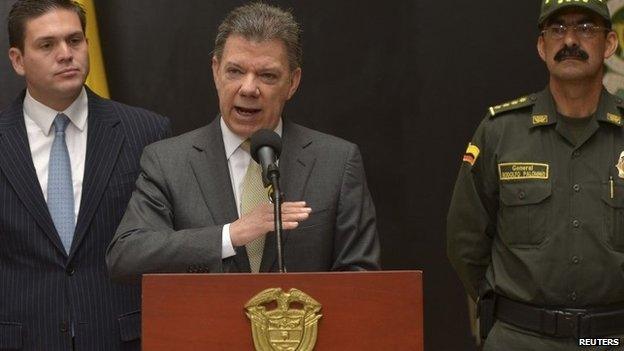Colombia army intelligence boss sacked over spying row
- Published

Colombia's President, Juan Manuel Santos, called the allegations against the army 'totally unacceptable'
Colombia's President Juan Manuel Santos has dismissed the army's intelligence head over allegations of spying on government officials negotiating with Farc rebels at peace talks in Cuba.
Gen Mauricio Ricardo Zuniga and another officer were relieved of their duties while a full investigation takes place.
An elite military group was set up to intercept the officials' mobile phone calls, the magazine Semana reported.
Mr Santos called the alleged interference "totally unacceptable".
The director of the army's technical intelligence centre, Gen Oscar Zuluaga, was also dismissed.
The sacking of both army officers was announced on Tuesday by the defence minister, Juan Carlos Pinzon, after a meeting with the Colombian chief prosecutor, Eduardo Montealegre.
'Not tolerated'
"In any case, any behaviour that affects people, even more if they are high-ranking government officials, cannot be tolerated," Mr Pinzon told reporters.
He added that a disciplinary investigation by the military justice is under way.
But a leftist congressman, Ivan Cepeda, who was also spied upon, according to the magazine Semana, demanded the resignation of the defence minister, the Associated Press news agency reported.
"Either the government was doing a kind of counterintelligence of its own people or this was an operation by a dissident sector in the military acting against the peace process," Mr Cepeda told AP.
The government has been in talks with the Farc, the country's largest left-wing rebel group, since November 2012.
Mr Santos recently said he hoped to sign a peace treaty with the left-wing rebels this year, ending the 50-year-old conflict.
But critics say the government should fight against, not negotiate, with the rebels.
The president reacted angrily to the allegations published by Semana on Tuesday, calling those responsible for the monitoring of emails, phone calls and mobile phone messages "dark forces".
"It's not acceptable from any point of view that intelligence is conducted against ordinary citizens and much less against state officials," he said.
The group that allegedly spied on officials in Cuba was run by the army but hired young hackers and experts, the Semana reports claims.
It says the unit was set up by the intelligence branch of the army, which years earlier successfully infiltrated Farc communications leading to the liberation of the former senator and hostage Ingrid Betancourt.
Unnamed sources told Semana that former Colombian Vice-President Humberto de la Calle was one of the government negotiators monitored by the unit.
Left-wing politicians such as former Senator Piedad Cordoba were also allegedly spied on, the magazine said.
The talks in the Cuban capital, Havana, are the fourth attempt since the 1980s.
But after more than 14 months, the two sides have only agreed tentatively on two points of a six-point agenda: land reform and political participation of the rebels in a post-war Colombia.
The conflict ÔÇô the longest-running in Latin America ÔÇô has killed an estimated 220,000 people since it began in the 1960s, with some three million more people internally displaced by the fighting.
- Published24 January 2014
- Published16 January 2014
- Published21 November 2013
- Published7 September 2013